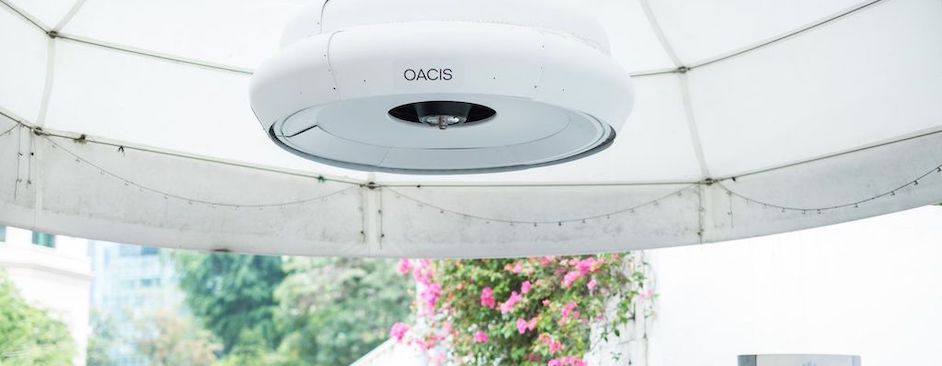
Can this sustainable cooling system replace environmentally damaging AC?
Just one degree of latitude north of the Equator, Singapore is hot and muggy at the best of times. In the summer months, it consistently reaches highs of 90 degrees. Humidity sits at a stifling average of 84% all year-round. Keeping spaces livable requires a lot of air-conditioning. And powering that air-conditioning is expensive—and has enormous environmental costs, as well.
That’s why Phononic, a global innovator of thermoelectric solutions, decided to test out its new cooling platform, OACIS, in the tropical Asian city-state. The platform—the winner of the Asia and Pacific regional category in Fast Company’s 2020 World Changing Ideas Awards—aims to eventually replace traditional compressor-based, HVAC cooling systems, many of which are guilty of contributing to global warming with hydrocarbons, with its new technology, which uses semiconductors to pull heat from the air. Tony Atti, the company’s CEO, hopes that the platform’s initial outdoor tests in Singapore have shown its efficacy, and that it’ll translate to other parts of the world, in both outdoor and indoor capacities.
“If you’re going to be disruptive and demonstrate your technology, you’d really like to try and find a proof point that has an acute cooling need,” Atti says. “And there are a few places on the planet more acute, and at the same time more progressive in sustainability, than Singapore.”
Phononic received a grant from Ecosperity, which is part of the Temasek Foundation, Singapore’s sovereign wealth fund. That allowed the company to deploy its new bladeless fans, which use the technology platform, in three busy outdoor locations: at a popular waterpark, at a cluster of restaurants, and in the swelteringly hot parking garage at the bustling Resorts World Sentosa. The fans stayed in place from November to January, in the city’s grueling heat. “It’s a bold and audacious way to get started,” Atti says, “because you have to not only deal with cooling a person or an area, but you have to do so in a combination with direct sunlight, humidity, and weather conditions.”
The OACIS platform is the latest iteration of Phononic’s semiconductor technology, which has been deployed in the fields of medical refrigeration and food and beverage storage. A collection of semiconductor chips inside the cooling device allow it to pull heat and humidity out of a particular area and transfer it to another. This is achieved via a concept known as the Peltier effect: as an electrical current runs between two different types of semiconductors, a temperature rise or drop occurs. That temperature change is magnified because there are multiple semiconductor chips, all of which help to push the heat in the same direction, leaving the original side cooler and less muggy.
This thermoelectric cooling is also known as solid-state cooling, because it’s the solid metal that transfers thermal energy, without the need for any liquid refrigerants. Those refrigerants, which can be toxic, are employed by classic HVAC systems to artificially create cool air, making them more environmentally unfriendly. Moreover, the OACIS system can cool accurately to the degree needed, as opposed to the overly frigid blasting that we’re used to.
Although the goals are ultimately environmental, Atti says, Singapore represents a market whose government is actively finding means to make the city more livable for its people. The system could simply allow residents to improve their way of life, and businesses to thrive. Some restaurants were able to open for lunch for the first time, because of the presence of the outdoor fans.
The company has taken data from the three-month pilot test in Singapore, and is aiming to use that to inform its next phase, making tweaks to performance, and then trying to extend to other Southeast Asian locales. And, after that, the system will turn to cooling indoor locations, with a goal to retrofit or integrate with current HVAC systems, in both commercial and residential properties.< As far as Atti knows, Phononic is the only company offering this type of outdoor thermoelectric cooling. He’s aware of the challenges: without direct competitors, it’s essentially creating a new market. But it’s an exciting time, especially now that Temasek, the Singaporean sovereign fund, has announced investment in Phononic. “As an entrepreneur, it’s unbelievably exciting to be that trailblazer for a category,” he says.
